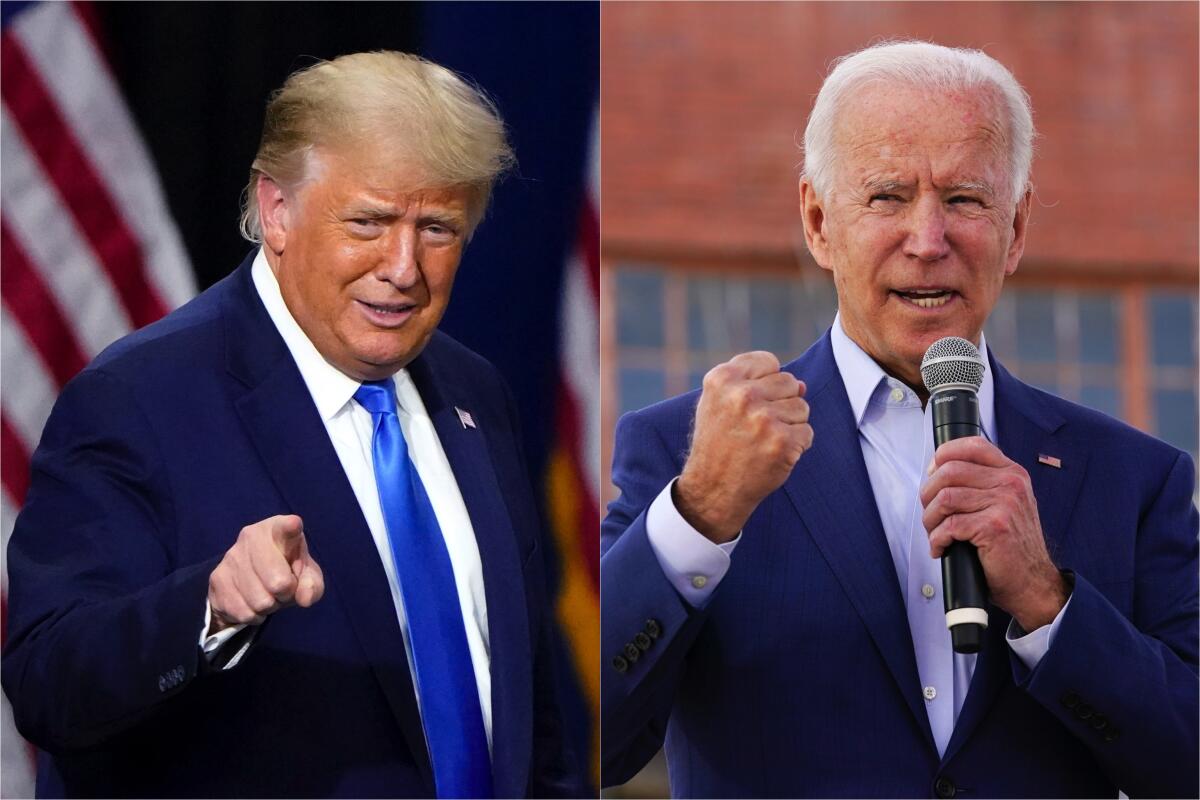Op-Ed: Are there pieces of Trump’s foreign policy worth keeping?

The shock of the Jan. 6 mob assault on the Congress and the stain on the image of American democracy will not wear off anytime soon. This moment has amplified the impulse to reject the vestiges of Trump administration policies.
In the realm of foreign policy, this would not be a stark departure from how incoming presidents have reacted to their predecessors’ agendas. The instinct to make swift, dramatic changes is understandable and can often be right. Eisenhower needed to find a way to end the Korean War. Kennedy needed to take account of the awakening in the developing nations that did not fit neatly into the two Cold War blocs. Nixon pledged to end the Vietnam War.
Yet, most administrations also discover that their judgments about their predecessor’s foreign policy can miss the mark. Bill Clinton went into office determined to reverse George H.W. Bush’s policy on the former Yugoslavia and within six months was not so sure it was wrong. George W. Bush scrapped the Clinton-era nuclear accord with North Korea because of North Korean cheating, only to negotiate another nuclear deal, which the North Koreans ultimately failed to honor.
Barack Obama felt he had to reverse the Bush approach to regime change in the Middle East, and yet by the time of the Arab Spring, he sided with the people in the squares trying to oust leaders in palaces. Obama also pledged to reverse Bush-era counter-terrorism policies but ultimately expanded many of them such as targeted strikes on terrorist leaders and broad-based surveillance.
Donald Trump stormed into the Oval Office pledging to reverse all of the signature Obama-era policies — pulling out of the Paris climate accord, the Trans-Pacific Partnership, and the Iran nuclear deal. More generally, his “America First” world view rejected many of the precepts of post-World War II American foreign policy in which U.S. alliances, leadership and commitments to other nations were foundational.
Even if Trump had not instigated the attack on democracy with conspiracy theories about a stolen election, there would be much to fix. First, President Biden must restore the integrity and perception of American democracy. Second, it is essential to show support for long-standing alliances and to promote democratic values while speaking out against authoritarian regimes. Third, the United States must be ready to shape coalitions to deal with pandemics, climate change and challenges that respect no borders.
While there is much to change, some Trump administration approaches to foreign policy should not be reversed reflexively. For example, in the Middle East, the recent establishment of formal relations between Israel and Arab countries of the United Arab Emirates, Bahrain, Sudan and Morocco creates new realities in the region. It reflects a strategic convergence between many Arab states and Israel, not just on threats but also on their common interest to promote more technologically driven economies and to address water and food security needs.
The Biden administration can build on these agreements and forge even more. It can broker Arab outreach to Israel to promote Israeli moves that could benefit the Palestinians and yield Palestinian responses. Normalization with Arab nations will not produce Israeli-Palestinian peace in the short run, but it can be a means to break the stalemate between Israelis and Palestinians and reestablish a sense of possibility.
The Trump administration’s wholesale withdrawal from the Iran nuclear agreement was a mistake and has given Iran an excuse to accelerate its nuclear program. Yet its “maximum pressure” campaign has certainly created leverage that should not be discounted. The supreme leader, Ali Khamenei, may be trying to force Iran onto the Biden administration’s agenda by, among other things, enriching uranium to 20% and showing that the Islamic Republic presents a problem that must be addressed. But, as his words in a recent speech indicate, the Iranian leader is doing so not because he wants the U.S. to rush to rejoin the nuclear deal but because he wants sanctions relief — which Iran should not get for free.
The Trump administration’s confrontational approach to China now resonates with members of Congress on both sides of the aisle. The COVID-19 pandemic has exacerbated concerns about China’s chokehold on supply chains and unfair trade practices. Even Biden has said that he was in no hurry to lift the tariffs Trump put on Chinese exports to the U.S. China’s widespread theft of intellectual property, expansion of its surveillance state beyond its borders, and human rights abuses in Hong Kong and Xinjiang will need to become a central focus for the Biden administration and our allies.
The beginning of a new administration is often a time for reversing course, but reflexive impulses in foreign policy are seldom right. Biden will need to demonstrate his ability to lead globally and heal America’s democracy in the wake of the Jan. 6 attack and the effects of the pandemic. Still, in forming his own foreign policy agenda, Biden should consider seriously the elements of his predecessor’s approach worth keeping.
Dennis Ross served in senior national security positions in the Reagan, George H.W. Bush, Clinton and Obama administrations. He is counselor at the Washington Institute for Near East Policy. Juan Zarate was deputy national security advisor in the George W. Bush administration. He is chairman of the Center on Economic and Financial Power at the Foundation for Defense of Democracies.
More to Read
A cure for the common opinion
Get thought-provoking perspectives with our weekly newsletter.
You may occasionally receive promotional content from the Los Angeles Times.










